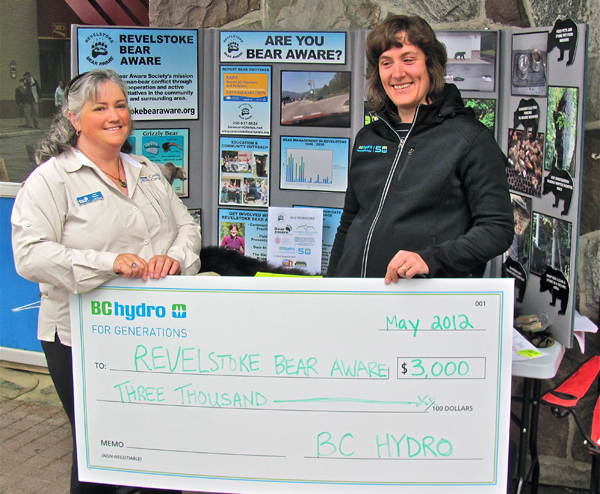
A recent cash donation by BC Hydro to Revelstoke Bear Aware will enhance the conservation of black and grizzly bears by educating people on how to reduce the risk of bears becoming habituated and food-conditioned, says Beare Aware Coordinator Sue Davies.
Bears conditioned to eating human food can become aggressive and often have to be destroyed. Both species of bears are keystone species in the Columbia Basin and as such, we cannot afford to be destroying them in our town.
“Our mission is to reduce human-bear conflict by reducing the amount of bear attractants in our communities,” she said. “Garbage is the primary bear attractant in Revelstoke, followed by fruit trees, livestock, poorly managed compost, and birdfeeders. Outdoor fridges and freezers, pet food left outside, and dirty BBQs are also bear attractants.”
Bears conditioned to eating human food can become aggressive and often have to be destroyed. Both species of bears are keystone species in the Columbia Basin and “as such, we cannot afford to be destroying them in our town,” Davies said.
Revelstoke Bear Aware urges residents to secure garbage in a garage or lockable shed, and to take down birdfeeders during the summer months. Keep your compost from becoming smelly; never add meat, fish, dairy products, or cooked food. As the season progresses, pick all fruit as or before it becomes ripe. If you have excess fruit or produce, contact Bear Aware at 250-837-8624, e-mail beaware@telus.net to arrange for volunteers from The Gleaning Project to collect or pick the fruit and donate it to Community Connections Food Bank.
Revelstoke Bear Aware will also be hosting a free electric fencing workshop on August 8 for anyone interested in finding out the best way to protect livestock, fruit trees, or other attractants from bears. Please call or see our website for details.
For more information on managing your attractants and information on upcoming events, see the Revelstoke Bear Aware website, www.revelstokebearaware.org, or visit the provincial Bear Aware website at www.bearaware.bc.ca
To report bear sightings or problem bears please call the RAPP line at 1-877-925 7277.



